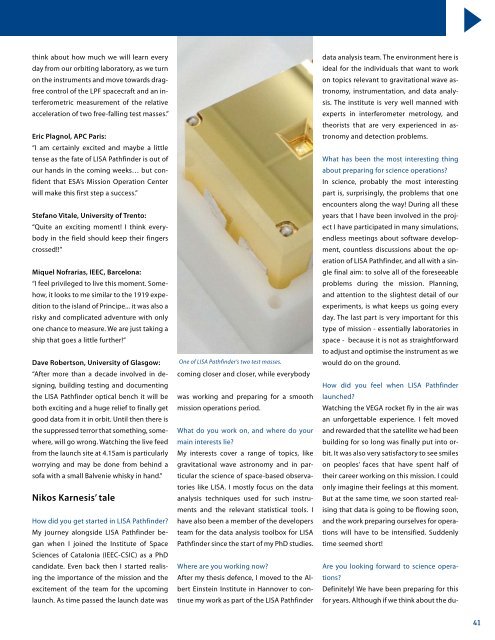LIGO
1M1Oj6U
1M1Oj6U
Create successful ePaper yourself
Turn your PDF publications into a flip-book with our unique Google optimized e-Paper software.
think about how much we will learn every<br />
day from our orbiting laboratory, as we turn<br />
on the instruments and move towards dragfree<br />
control of the LPF spacecraft and an interferometric<br />
measurement of the relative<br />
acceleration of two free-falling test masses.”<br />
Eric Plagnol, APC Paris:<br />
“I am certainly excited and maybe a little<br />
tense as the fate of LISA Pathfinder is out of<br />
our hands in the coming weeks… but confident<br />
that ESA’s Mission Operation Center<br />
will make this first step a success.”<br />
Stefano Vitale, University of Trento:<br />
“Quite an exciting moment! I think everybody<br />
in the field should keep their fingers<br />
crossed!!”<br />
Miquel Nofrarias, IEEC, Barcelona:<br />
“I feel privileged to live this moment. Somehow,<br />
it looks to me similar to the 1919 expedition<br />
to the island of Principe... it was also a<br />
risky and complicated adventure with only<br />
one chance to measure. We are just taking a<br />
ship that goes a little further!“<br />
Dave Robertson, University of Glasgow:<br />
“After more than a decade involved in designing,<br />
building testing and documenting<br />
the LISA Pathfinder optical bench it will be<br />
both exciting and a huge relief to finally get<br />
good data from it in orbit. Until then there is<br />
the suppressed terror that something, somewhere,<br />
will go wrong. Watching the live feed<br />
from the launch site at 4.15am is particularly<br />
worrying and may be done from behind a<br />
sofa with a small Balvenie whisky in hand.”<br />
Nikos Karnesis’ tale<br />
How did you get started in LISA Pathfinder?<br />
My journey alongside LISA Pathfinder began<br />
when I joined the Institute of Space<br />
Sciences of Catalonia (IEEC-CSIC) as a PhD<br />
candidate. Even back then I started realising<br />
the importance of the mission and the<br />
excitement of the team for the upcoming<br />
launch. As time passed the launch date was<br />
One of LISA Pathfinder’s two test masses.<br />
coming closer and closer, while everybody<br />
was working and preparing for a smooth<br />
mission operations period.<br />
What do you work on, and where do your<br />
main interests lie?<br />
My interests cover a range of topics, like<br />
gravitational wave astronomy and in particular<br />
the science of space-based observatories<br />
like LISA. I mostly focus on the data<br />
analysis techniques used for such instruments<br />
and the relevant statistical tools. I<br />
have also been a member of the developers<br />
team for the data analysis toolbox for LISA<br />
Pathfinder since the start of my PhD studies.<br />
Where are you working now?<br />
After my thesis defence, I moved to the Albert<br />
Einstein Institute in Hannover to continue<br />
my work as part of the LISA Pathfinder<br />
data analysis team. The environment here is<br />
ideal for the individuals that want to work<br />
on topics relevant to gravitational wave astronomy,<br />
instrumentation, and data analysis.<br />
The institute is very well manned with<br />
experts in interferometer metrology, and<br />
theorists that are very experienced in astronomy<br />
and detection problems.<br />
What has been the most interesting thing<br />
about preparing for science operations?<br />
In science, probably the most interesting<br />
part is, surprisingly, the problems that one<br />
encounters along the way! During all these<br />
years that I have been involved in the project<br />
I have participated in many simulations,<br />
endless meetings about software development,<br />
countless discussions about the operation<br />
of LISA Pathfinder, and all with a single<br />
final aim: to solve all of the foreseeable<br />
problems during the mission. Planning,<br />
and attention to the slightest detail of our<br />
experiments, is what keeps us going every<br />
day. The last part is very important for this<br />
type of mission - essentially laboratories in<br />
space - because it is not as straightforward<br />
to adjust and optimise the instrument as we<br />
would do on the ground.<br />
How did you feel when LISA Pathfinder<br />
launched?<br />
Watching the VEGA rocket fly in the air was<br />
an unforgettable experience. I felt moved<br />
and rewarded that the satellite we had been<br />
building for so long was finally put into orbit.<br />
It was also very satisfactory to see smiles<br />
on peoples’ faces that have spent half of<br />
their career working on this mission. I could<br />
only imagine their feelings at this moment.<br />
But at the same time, we soon started realising<br />
that data is going to be flowing soon,<br />
and the work preparing ourselves for operations<br />
will have to be intensified. Suddenly<br />
time seemed short!<br />
Are you looking forward to science operations?<br />
Definitely! We have been preparing for this<br />
for years. Although if we think about the du-<br />
41


